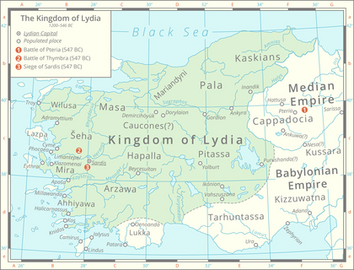Mints of Lydia
Coins | Mint
c. 700 BC/BCE to unknown date
According to Herodotus, the Lydians were the first people to use gold and silver coins and the first to establish retail shops in permanent locations. It is not known, however, whether Herodotus meant that the Lydians were the first to use coins of pure gold and pure silver or the first precious metal coins in general. Despite this ambiguity, this statement of Herodotus is one of the pieces of evidence most often cited on behalf of the argument that Lydians invented coinage, at least in the West, although the first coins (under Alyattes I, reigned c.591–c.560 BC) were neither gold nor silver but an alloy of the two called electrum. The dating of these first stamped coins is one of the most frequently debated topics of ancient numismatics, with dates ranging from 700 BC to 550 BC, but the most common opinion is that they were minted at or near the beginning of the reign of King Alyattes.
Subject ID: 127858
Morec. 700 BC/BCE to unknown date
According to Herodotus, the Lydians were the first people to use gold and silver coins and the first to establish retail shops in permanent locations. It is not known, however, whether Herodotus meant that the Lydians were the first to use coins of pure gold and pure silver or the first precious metal coins in general. Despite this ambiguity, this statement of Herodotus is one of the pieces of evidence most often cited on behalf of the argument that Lydians invented coinage, at least in the West, although the first coins (under Alyattes I, reigned c.591–c.560 BC) were neither gold nor silver but an alloy of the two called electrum. The dating of these first stamped coins is one of the most frequently debated topics of ancient numismatics, with dates ranging from 700 BC to 550 BC, but the most common opinion is that they were minted at or near the beginning of the reign of King Alyattes.
Subject ID: 127858
Subject ID: 127858
